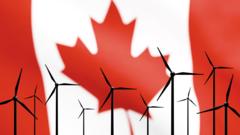Mark Carney, who has a reputation as an international climate champion, has faced criticism for repealing the carbon tax introduced by his predecessor. This move reflects a strategic pivot to address pressing economic concerns, even as Canada grapples with climate-related disasters and commitments to reduce emissions. While Carney aims to position Canada as a leader in both conventional and green energy, his approach raises questions about the country’s environmental commitments.
On the opposite side, Pierre Poilievre is championing the expansion of the oil and gas sector while opposing the carbon tax, appealing to voters in energy-rich regions who are more focused on immediate economic issues. Although Poilievre’s plans lack clarity on meeting net-zero goals, he maintains that developing Canada's oil and gas is essential for global energy needs.
As candidates gear up for election day on April 28, the balancing act between economic growth through fossil fuels and meeting international climate obligations has become one of the defining issues of the campaign. Notably, while there is bipartisan support for increasing energy production, the true implications for climate change remain contentious, with critics raising alarms about the long-term environmental impact of such policies.
This tension highlights the challenge that candidates face as they navigate the priorities of the electorate, with immediate economic concerns conflicting with the urgent need for climate action in a changing world.
On the opposite side, Pierre Poilievre is championing the expansion of the oil and gas sector while opposing the carbon tax, appealing to voters in energy-rich regions who are more focused on immediate economic issues. Although Poilievre’s plans lack clarity on meeting net-zero goals, he maintains that developing Canada's oil and gas is essential for global energy needs.
As candidates gear up for election day on April 28, the balancing act between economic growth through fossil fuels and meeting international climate obligations has become one of the defining issues of the campaign. Notably, while there is bipartisan support for increasing energy production, the true implications for climate change remain contentious, with critics raising alarms about the long-term environmental impact of such policies.
This tension highlights the challenge that candidates face as they navigate the priorities of the electorate, with immediate economic concerns conflicting with the urgent need for climate action in a changing world.



















